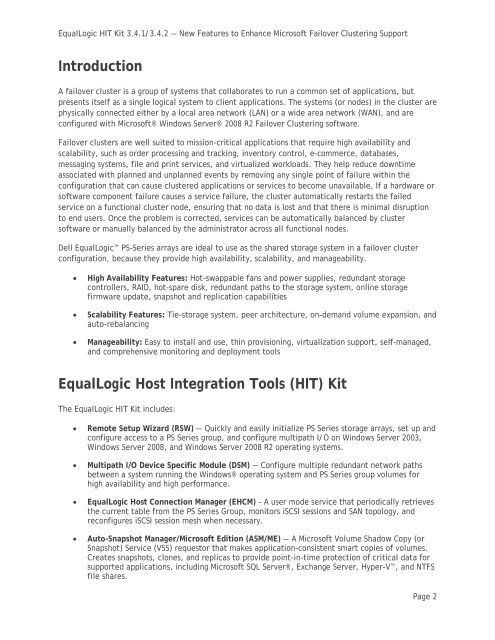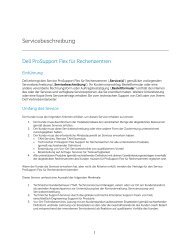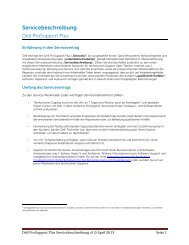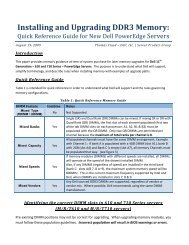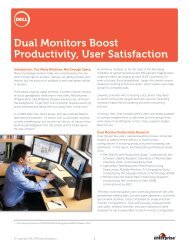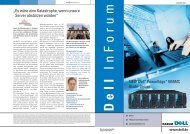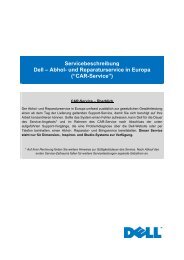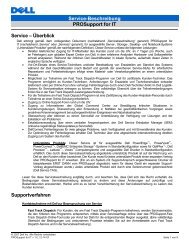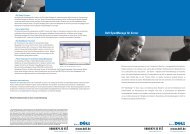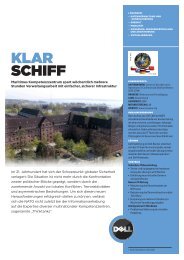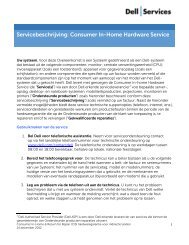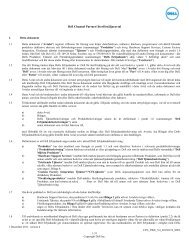TOOLS (HIT) KIT 3.4.1/3.4.2 — - Dell
TOOLS (HIT) KIT 3.4.1/3.4.2 — - Dell
TOOLS (HIT) KIT 3.4.1/3.4.2 — - Dell
Create successful ePaper yourself
Turn your PDF publications into a flip-book with our unique Google optimized e-Paper software.
EqualLogic <strong>HIT</strong> Kit <strong>3.4.1</strong>/<strong>3.4.2</strong> <strong>—</strong> New Features to Enhance Microsoft Failover Clustering Support<br />
Introduction<br />
A failover cluster is a group of systems that collaborates to run a common set of applications, but<br />
presents itself as a single logical system to client applications. The systems (or nodes) in the cluster are<br />
physically connected either by a local area network (LAN) or a wide area network (WAN), and are<br />
configured with Microsoft® Windows Server® 2008 R2 Failover Clustering software.<br />
Failover clusters are well suited to mission-critical applications that require high availability and<br />
scalability, such as order processing and tracking, inventory control, e-commerce, databases,<br />
messaging systems, file and print services, and virtualized workloads. They help reduce downtime<br />
associated with planned and unplanned events by removing any single point of failure within the<br />
configuration that can cause clustered applications or services to become unavailable. If a hardware or<br />
software component failure causes a service failure, the cluster automatically restarts the failed<br />
service on a functional cluster node, ensuring that no data is lost and that there is minimal disruption<br />
to end users. Once the problem is corrected, services can be automatically balanced by cluster<br />
software or manually balanced by the administrator across all functional nodes.<br />
<strong>Dell</strong> EqualLogic PS-Series arrays are ideal to use as the shared storage system in a failover cluster<br />
configuration, because they provide high availability, scalability, and manageability.<br />
• High Availability Features: Hot-swappable fans and power supplies, redundant storage<br />
controllers, RAID, hot-spare disk, redundant paths to the storage system, online storage<br />
firmware update, snapshot and replication capabilities<br />
• Scalability Features: Tie-storage system, peer architecture, on-demand volume expansion, and<br />
auto-rebalancing<br />
• Manageability: Easy to install and use, thin provisioning, virtualization support, self-managed,<br />
and comprehensive monitoring and deployment tools<br />
EqualLogic Host Integration Tools (<strong>HIT</strong>) Kit<br />
The EqualLogic <strong>HIT</strong> Kit includes:<br />
• Remote Setup Wizard (RSW) <strong>—</strong> Quickly and easily initialize PS Series storage arrays, set up and<br />
configure access to a PS Series group, and configure multipath I/O on Windows Server 2003,<br />
Windows Server 2008, and Windows Server 2008 R2 operating systems.<br />
• Multipath I/O Device Specific Module (DSM) <strong>—</strong> Configure multiple redundant network paths<br />
between a system running the Windows® operating system and PS Series group volumes for<br />
high availability and high performance.<br />
• EqualLogic Host Connection Manager (EHCM) – A user mode service that periodically retrieves<br />
the current table from the PS Series Group, monitors iSCSI sessions and SAN topology, and<br />
reconfigures iSCSI session mesh when necessary.<br />
• Auto-Snapshot Manager/Microsoft Edition (ASM/ME) <strong>—</strong> A Microsoft Volume Shadow Copy (or<br />
Snapshot) Service (VSS) requestor that makes application-consistent smart copies of volumes.<br />
Creates snapshots, clones, and replicas to provide point-in-time protection of critical data for<br />
supported applications, including Microsoft SQL Server®, Exchange Server, Hyper-V, and NTFS<br />
file shares.<br />
Page 2


